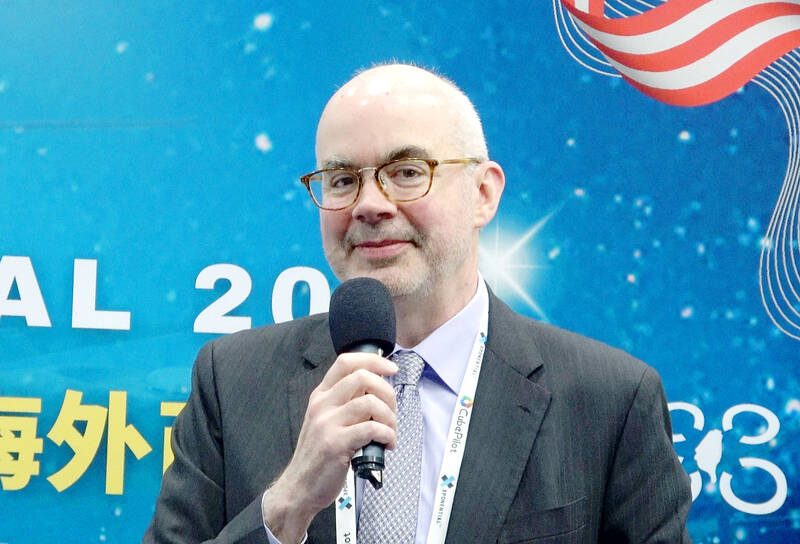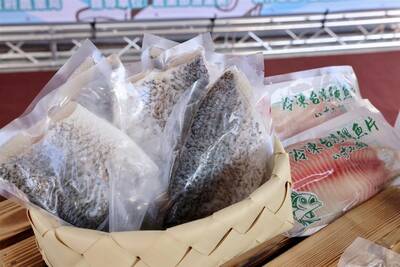The US and Taiwan cooperate in three key areas to develop drone technology, not only to enhance deterrence across the Taiwan Strait, but also to grow the industry, American Institute in Taiwan (AIT) Director Raymond Greene said.
Citing the success of the Ukrainian military in the Black Sea to neutralize Russia’s modern naval fleet using a combination of drones and uncrewed munitions, Greene said “the defense applications of drones are critically important to preserving peace and security in the Taiwan Strait.”
The de facto US ambassador to Taiwan made the remark in an interview with the Central News Agency on Tuesday in Houston, where he toured XPONENTIAL, a trade show focused on the uncrewed system industry, as part of his trip to attend the SELECTUSA Summit last week with a delegation of Taiwanese investors.

Photo: CNA
Greene identified military and commercial drone applications as key areas for enhanced US-Taiwan cooperation when he took office as AIT director in July last year, expressing hope that bringing together the US’ research and development skills and Taiwan’s manufacturing strength could help boost the drone industry’s growth.
Asked about the latest developments on that front, Greene said the cooperation focuses on three areas: applying artificial intelligence (AI) to drone operations, supply chain integration and investment.
He contrasted past military advancements — centered on GPS and precision-guided munitions — with the future, which he said would be shaped by the application of AI technologies to improve survivability and effectiveness.
On supply chain integration, Greene said it would allow companies on both sides to have “a trusted network” where they can quickly verify and understand that their partners are free of components or other influence from potential adversaries, such as China.
Many Taiwan companies are already looking to invest in the US, partly to meet requirements that a certain percentage of components for Pentagon projects be made locally, and partly because they see a growing number of potential clients, as more state and local governments stop buying drones from China due to security concerns, Greene said.
The use of drones goes far beyond defense, covering everything from environmental tasks to emergency response, agriculture and scientific research, he said.
The Taiwanese delegation was composed of more than 180 businesspeople from more than 130 companies, with a focus on AI and semiconductors, in addition to drones, he said.
Traveling with the delegation, Greene said he had the chance to visit some US and Taiwanese companies, which made him appreciate how closely the US and Taiwan work together across the entire AI supply chain.
Another takeaway from speaking with both US and Taiwanese companies is “how much these three sectors are actually working together to advance the frontiers of US Taiwan competitiveness,” he said.
All of this work leads to not only economic resilience and economic benefits for the US and Taiwan, but also helps achieve US President Donald Trump’s goal of reindustrializing the US, he added.

Taiwan's Vice President Hsiao Bi-khim (蕭美琴) said Saturday that she would not be intimidated by the Chinese Communist Party (CCP), following reports that Chinese agents planned to ram her car during a visit to the Czech Republic last year. "I had a great visit to Prague & thank the Czech authorities for their hospitality & ensuring my safety," Hsiao said on social media platform X. "The CCP's unlawful activities will NOT intimidate me from voicing Taiwan's interests in the international community," she wrote. Hsiao visited the Czech Republic on March 18 last year as vice president-elect and met with Czech Senate leadership, including

There have been clear signs of Chinese Communist Party (CCP) attempts to interfere in the nationwide recall vote on July 26 in support of Chinese Nationalist Party (KMT) legislators facing recall, an unnamed government official said, warning about possible further actions. The CCP is actively involved in Taiwanese politics, and interference in the recall vote is to be expected, with multiple Chinese state media and TAO attempts to discredit the Democratic Progressive Party (DPP) and undermine public support of their recall movement, the official said. This interference includes a smear campaign initiated this month by a pro-Beijing Hong Kong news outlet against

A week-long exhibition on modern Tibetan history and the Dalai Lama’s global advocacy opened yesterday in Taipei, featuring quotes and artworks highlighting human rights and China’s ongoing repression of Tibetans, Hong Kongers and Uighurs. The exhibition, the first organized by the Human Rights Network for Tibet and Taiwan (HRNTT), is titled “From the Snowy Ridges to the Ocean of Wisdom.” “It would be impossible for Tibetans inside Tibet to hold an exhibition like this — we can do it. because we live in a free and democratic country,” HRNTT secretary-general Tashi Tsering said. Tashi Tsering, a Taiwan-based Tibetan who has never

A first shipment of five tons of Taiwan tilapia was sent from Tainan to Singapore on Wednesday, following an order valued at NT$600,000 (US$20,500) placed with a company in the city. The products, including frozen whole fish and pre- cooked fish belly, were dispatched from Jiangjun Fishing Harbor, where a new aquatic processing and logistics center is under construction. At the launch, Tainan Mayor Huang Wei-che (黃偉哲) called the move a “breakthrough,” marking Taiwan’s expansion into the Singaporean tilapia market. Taiwan’s tilapia exports have traditionally focused on the United States, Canada, and the Middle East, Huang said, adding that the new foothold in